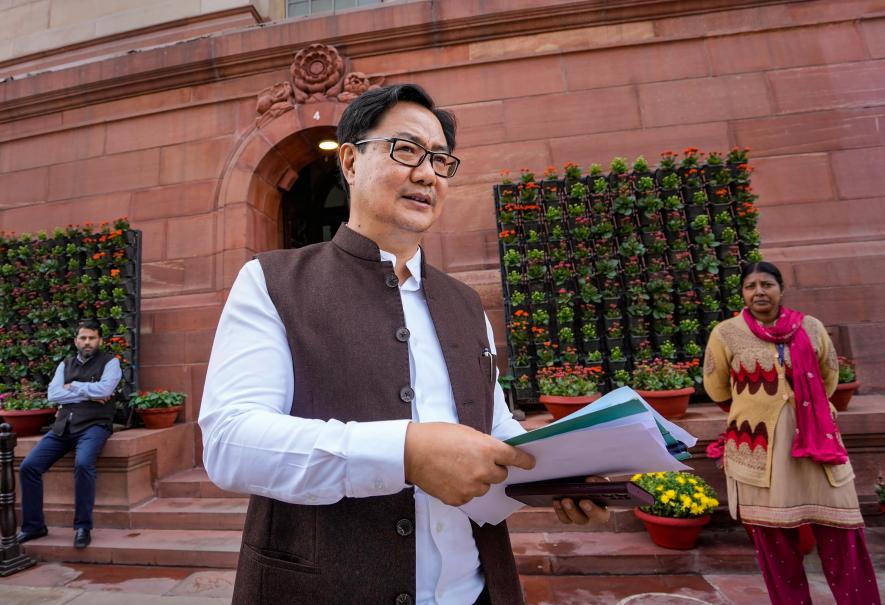Stop Threatening Judiciary: AILU Slams Rijiju’s Supreme Court Remarks

Image Courtesy: PTI
The All India Lawyers Union (AILU) has criticised the “intimidation and threatening of the judiciary” by the government and the recent “veiled threat” by Union law minster Kiran Rijiju.
In a press statement released on Wednesday, the AILU mentioned Rijiju’s recent statement against the judiciary in which he said, “Never say that the government is sitting on the files. Don’t send the files to the government then; you appoint yourself and you run the show.”
On December 15, the minister informed the Rajya Sabha that the government had “referred back” 20 names for appointment as High Court Judges by the Supreme Court (SC) Collegium and that “questions will keep arising on the vacancy of Judges and appointments till we create a new system for appointments”.
On December 14, Rijiju said that if the SC “starts hearing bail applications and all frivolous PILs, it will definitely cause a lot of extra burden on the honourable court” despite the top court, as per the Constitution, is the custodian of Fundamental Rights, including freedom and personal liberty, the AILU said.
“The vice-president has also openly blamed and criticised the judiciary for exercising the power of judicial review against parliamentary legislation,” the statement read.
“These statements are clear veiled threats and intimidation of the judiciary—an attempt to tame the judiciary to facilitate authoritarianism and fascism,” the AILU alleged.
Stating that democracy is “more than periodic election and legislative supremacy”, the AILU said, “The power of judicial review given to constitutional courts is the basic structure of our Constitution, which adopted parliamentary democracy. If democracy is anchored only on the supremacy of legislature, it will lead to authoritarianism and fascism through the very same democratic process.”
Terming the government statements “wholly inappropriate, impertinent and condemnable”, the AILU said that it is a “direct infringement of the independence of the judiciary a sort of browbeating of the judiciary. It is plainly not acceptable”.
Alleging that the RSS is a “fascist organisation which guides and leads the political executive of the Union government”, the AILU said, “The RSS has also joined the tirade against the judiciary. It shows that it is not a bona fide criticism but a highly ill-motivated, well-orchestrated and synchronised action to pressure the judiciary—one step forward, towards authoritarianism.”
“Our criticism of the Collegium system is not to bring back the dominance of the executive in the matter of appointment and transfer of Judges or to facilitate the executive to transgress the powers and to interfere with the independence of the judiciary.” The AILU said that the recent “outburst” against the judiciary was due to the “frustration of the executive for unable to bargain with the judiciary and meddle with its function as they expected or wished. The executive should remind itself that it cannot take an authoritarian stand against Collegium recommendations and till a better democratic, independent transparent system is created, the government should honour the Collegium system”.
The Centre has “practically dishonoured the Collegium resolution on transfer/appointment of Chief Justices of various High Courts by splitting up the resolution of the Collegium of Supreme Court dated September 28, 2022”, the AILU said. “The Central government has been splitting up the Collegium resolutions/ recommendations of names for appointment of High Court Judges and holding up certain names selectively for extra-constitutional political reasons.”
Despite the “ample opportunity and scope for further amendment of the Constitution to bring in a perfect National Judicial Commission within the four corners of Fourth Judges Case judgement, the Union government did not show any interest in that matter”, the statement further read.
“The reason is that the executive was under the impression that the Collegium system was more favourable for them to push their own persons/persons of their choice on political consideration. The RSS outburst and allegations of communist influence on the judiciary are only to legitimise their concerted effort to saffronise the judiciary,” the AILU alleged.
The AILU has been “campaigning for an independent autonomous National Judicial Commission (NJC) with constitutional status and comprehensive powers for selection and appointment of Judges of High courts and Supreme Court, transfer of judges of the High Courts and for to inquire into their misdemeanour/misconduct, highlighting the perils of Collegium system and its inability to safeguard the independence and accountability of the judiciary for a healthy democracy”.
The lawyers union said that all the “stakeholders of the justice delivery system—judiciary, executive, legislature and the Bar and civil society—shall have representation/roles in this process; necessarily, it should be without any unilateral powers/dominance of the executive or the judiciary”.
“This is not the concept of National Judicial Appointment Commission brought by the BJP government, as per the National Judicial Appointments Commission Act, 2014, and constitutional amendment involved in Fourth Judges Case judgement.”
The AILU said that its proposal for an independent autonomous NJC is the introduction of “further constitutional amendments within the four corners of the Fourth Judges Case”.
“Two private bills (the Constitution Amendment Bill, 2022 and The National Judicial Commission Bill, 2022) presented in the Rajya Sabha by our President Bikas Ranjan Battacharya, MP, are in the right direction. In this proposal, the law minister has no role in the selection of Judges. The law minister will not be a member of the National Judicial Commission. Instead, the attorney general of India “should be a member of the Commission.”
The AILU said that two independent eminent persons as members of the Commission will be selected by the full court of the Supreme Court from a panel submitted by a Committee consisting of the Prime Minister, Chief Justice of India, the Leader of Opposition in the Lok Sabha or where there is no such Leader of Opposition, the leader of single largest opposition party in the Lok Sabha and a nominee of the Bar Council of India.
Get the latest reports & analysis with people's perspective on Protests, movements & deep analytical videos, discussions of the current affairs in your Telegram app. Subscribe to NewsClick's Telegram channel & get Real-Time updates on stories, as they get published on our website.
























